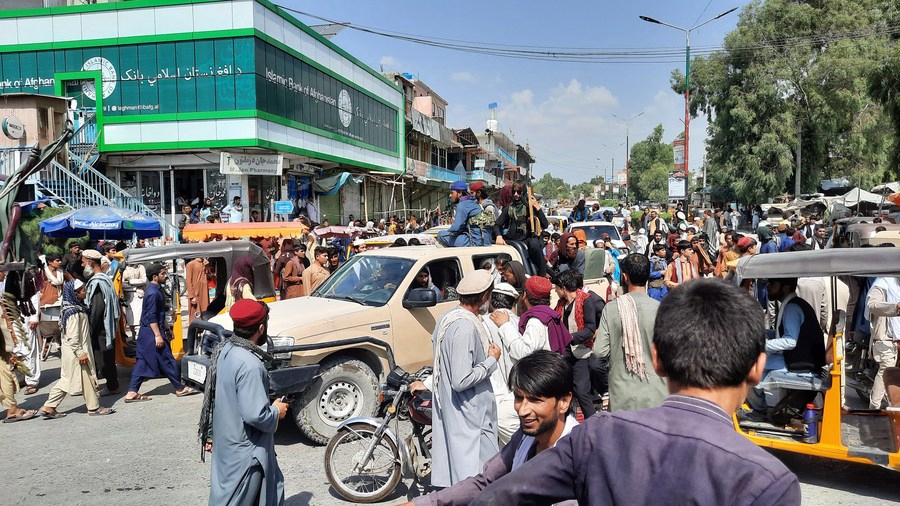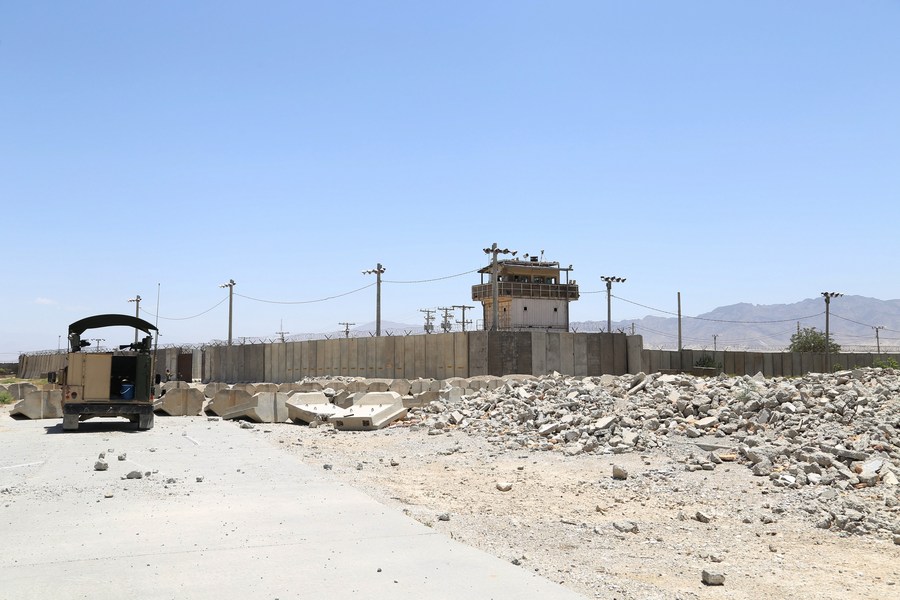
Taliban are seen in Mehtarlam, capital of Laghman province, eastern Afghanistan, August 15, 2021. /Xinhua
Taliban are seen in Mehtarlam, capital of Laghman province, eastern Afghanistan, August 15, 2021. /Xinhua
Editor's note: Bobby Naderi is a London-based journalist, guest contributor in print, radio and television, and documentary filmmaker. The article reflects the author's opinions, and not necessarily the views of CGTN.
Afghan President Mohammad Ashraf Ghani left the country on the night of August 15 as the Taliban made their way into Kabul amidst the withdrawal of U.S. forces from the country.
Advocates of occupation and war hawks call the U.S. withdrawal a disastrous political mistake made by President Joe Biden, but the extended occupation was the biggest mistake as well as the illegal, unjust and unwinnable war.
The situation unfolding right now underscores how important it is for the "Empire of Chaos" to acknowledge that it has a terrible and bloody track record and that it failed to "democratize" the war-torn country. It was a colossal waste of resources.
The U.S. has no right or capacity to reshape any country as it wishes. The imperialistic mistake of occupying Afghanistan must not be repeated elsewhere and under any circumstances or pretexts at all. Many innocent civilians were killed unjustly and for no reason at all.
The fading of a nation
The reality of Afghanistan's desolation might be attributed to the fact that it has been a never-ending center of insurgency, war and geopolitical ambition. Named "The Graveyard of Empires," the country has experienced a lot.
The U.S. contributed thoroughly to its demise as a nation, having invested heavily in its support of insurgent movements in the 1980s to defeat the influence of the former Soviet Union and the Afghan socialist state.
The imperialistic move backfired in its empowerment of extremism and the subsequent rise of Taliban rule, which were later allegedly linked by Washington to the 9/11 attacks, thus leading to the invasion of the country in 2001. During the occupation, the U.S. tried persistently to linger in the country, designed to meet its illicit interests, not the interests of Afghans.
The Taliban were resilient against the U.S. occupation and thrived on the country's poor governance structures and desolate economy to sustain influence. Its fighters seized many territories and overran the main cities of Herat in the west and Kandahar in the south. In Washington, the Pentagon deployed thousands of troops to Kabul airport to oversee a full withdrawal from its embassy as the city was set to fall under Taliban takeover.
Biden can say he bears "zero responsibility" for Taliban's retaking of the capital, but he cannot change the fact that the U.S. bears full responsibility for facilitating mass atrocities. It repeatedly and publicly promised to stand by the Afghans and help them secure their country. But given the recent developments, the Afghans are no longer betting their future on Washington's promises.

The Bagram Airfield after all U.S. and NATO forces evacuated, in Parwan province, eastern Afghanistan, July 2, 2021. /Xinhua
The Bagram Airfield after all U.S. and NATO forces evacuated, in Parwan province, eastern Afghanistan, July 2, 2021. /Xinhua
The blow to U.S. prestige
With the Taliban on a roll, it is clear that the U.S. lost the endless war. With no Security Council authorization, the U.S.-led invasion constituted armed aggression, creating a humanitarian catastrophe for the people of Afghanistan that continues today.
The U.S. portrayed the 9/11 attacks as criminal acts and promised to prosecute criminals under national and international laws. But instead of setting up an international tribunal and seeking the arrest of the alleged perpetrators, the U.S. and company invaded and occupied Afghanistan that resulted in the deaths, injuries, starvation and displacement of hundreds of thousands of Afghans, and the destruction of their already dilapidated infrastructure and property.
Likewise, the U.S. achieved nothing politically after two decades of desultory, destruction and titanic expenditure. American forces are now on the strategic defensive and withdrawal – just like in Vietnam.
For all its heavy bombers, strike fighters, missiles, helicopter gunships and drones as well as all the other high tech weapons of modern war, the U.S. couldn't defeat tribal fighters armed with nothing more than light weapons and valor. This has to be yet another blow to American prestige following the disastrous war on Iraq and the subsequent human suffering.
As it happens, war-party Washington had no chance in securing its colonial goals in Afghanistan. This was not U.S. troops stationed in post-war Germany or Japan. U.S. troops in those countries helped to stabilize Europe and East Asia. In Afghanistan, they projected power, exercised influence, maintained regional hegemony and threatened Afghanistan's neighbors. It was always a lose-lose case for Washington and its perceived allies.
Despite all of this, expect the "Empire of Chaos" to not leave Afghanistan alone any time soon. This is the same international interventionist that the people of Afghanistan will have to fight longer after the withdrawal and the quick unraveling.
From experience, the U.S. will never stop trying to force them to regain control. It may attempt to do this by means of air war, economic sanctions and diplomatic pressure after the doomed and deadly military pursuit.
(If you want to contribute and have specific expertise, please contact us at opinions@cgtn.com.)

